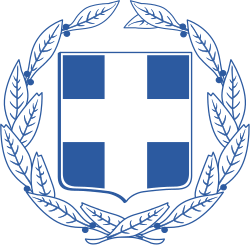Decentralized Administration of the Aegean
| Αποκεντρωμένη Διοίκηση Αιγαίου | |
 | |
| Agency overview | |
|---|---|
| Formed | 1 January 2011 |
| Jurisdiction | Government of Greece |
| Headquarters |
Piraeus, Attica 37°57′N 23°38′E / 37.950°N 23.633°E |
| Agency executive |
|
| Website |
www |
| Map | |
|
Location of the Aegean in Greece | |
| Area served | |
| Supervised regions | North Aegean, South Aegean |
| Regional units | 18 |
| Municipalities | 43 |
| Area (land mass) | 9,122 km2 (3,522 sq mi)[1] |
| Population | 508,246 (as of 2011)[2] |
The Decentralized Administration of the Aegean (Greek: Αποκεντρωμένη Διοίκηση Αιγαίου) is one of the seven decentralized administrations of Greece, consisting of the regions of North Aegean and South Aegean. Seated in Piraeus, Attica, it is currently led by Acting Secretary-General Nikos Theodoridis.
Formation and tasks
Decentralized Administrations were created in January 2011 as part of a far-reaching reform of the country's administrative structure, the Kallikratis reform (Law 3852/2010).[3]
They enjoy both administrative and financial autonomy[1] and exercise devolved state powers in urban planning, environmental and energy policy, forestry, migration and citizenship.[4] Beyond that, they are tasked with supervising the first and second-level self-governing bodies: the municipalities and regions, in this case the 43 municipalities of the Aegean and the two regions themselves.
Characteristics
The Decentralized Administration of the Aegean is seated outside its own territory in Piraeus, Attica. It is however the most decentralized administration with organizational structures all over the Aegean Islands.[5]
Covering a landmass of 9,122 km2 (3,522 sq mi),[1] the Aegean is one of the smallest of the seven decentralized administrations by area, and with an overall population of 508,246[2] also the least populous.
In the European NUTS nomenclature, the two regions of the Aegean together with Crete form the first level NUTS region EL4 (Nisia Aigaiou, Kriti).
Secretary-General
The Decentralized Administration is led by a Secretary-General (Γενικός Γραμματέας) who is appointed or dismissed by a Cabinet decision upon request of the Greek Minister of Interior,[5] and is therefore considered the senior representative of the national government in the regions.
Following the electoral victory of Syriza in January 2015, the new Minister for the Interior, Nikos Voutsis, declared that the decentralized administrations would be abolished, and their powers transferred to the regions. Until this reform is formalized, and as the Secretaries-General appointed by the previous administration resigned on 2 February, the decentralized administrations are run by their senior civil servants as Acting Secretaries-General.[6][7] The current Acting Secretary-General is Nikos Theodoridis.
List of Secretaries-General
- Fotis Chatzimichalis (PASOK), January 2011 – August 2012
- Christiana Kalogirou (Nea Dimokratia), August 2012 – April 2014
- Spyros Spyridon (Nea Dimokratia), April 2014 – February 2015
- Nikos Theodoridis (Independent), since February 2015
References
- 1 2 3 Ministry of Interior 2013, p. 12
- 1 2 "Demographic and social characteristics of the Resident Population of Greece according to the 2011 Population - Housing Census revision of 20/3/2014" (PDF). Hellenic Statistical Authority. 12 September 2014.
- ↑ Ministry of Interior 2013, p. 10 f..
- ↑ Ministry of Interior 2013, p. 27.
- 1 2 Ministry of Interior 2013, p. 19
- ↑ Tania Georgiopoulou (5 February 2015). Κατάργηση Αποκεντρωμένων Διοικήσεων (in Greek). Kathimerini. Retrieved 4 April 2015.
- ↑ Ο Βούτσης «καταργεί» τις Αποκεντρωμένες Διοικήσεις – Κίνηση-ματ υπέρ των αιρετών Περιφερειών (in Greek). aftodioikisi.gr. 3 February 2015. Retrieved 4 April 2015.
Literature
- Ministry of Interior (January 2013). "Structure and operation of local and regional democracy". Council of Europe.
External links
- Official website (Greek)

